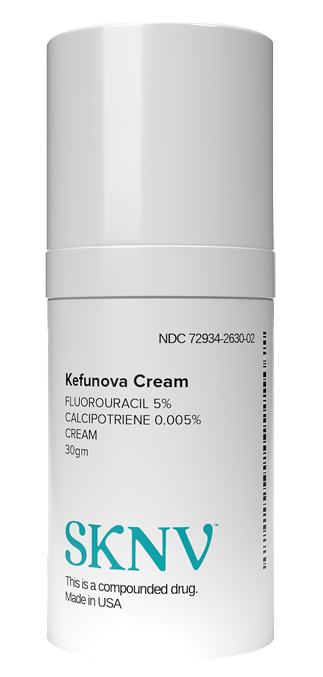By Nathalie De Champlain
Millions of Americans* annually could be candidates for topical 5-FU treatment for actinic keratosis or superficial basal cell carcinoma (sBCC). But these numbers are not just statistics — they represent millions of real lives impacted by these chronic skin conditions.

Here is one story:
“I have hundreds of actinic keratoses on my legs, arms, shoulders, chest, back, face, and scalp. I tried a treatment, but after five weeks, I had to stop due to unbearable itching. New skin growths kept appearing even as the treated areas were trying to heal. It felt endless. I’m desperate to heal these skin conditions, but I also want to do it right. Can my doctor prescribe me SKNV? Do you have a formulation that addresses my skin health needs?”
This deeply personal experience highlights a critical truth: patients are not only battling visible lesions, but also emotional exhaustion, frustration, and the fear of ongoing skin damage. Behind every diagnosis are human stories of resilience — and a profound demand for new medication options.
Stories like this are what drive innovation in dermatology — real patients, real struggles, and a genuine need for new options in clinical care.
For healthcare professionals managing patients with multiple actinic keratoses or superficial basal cell carcinoma, KEFUNOVA™ Cream represents a meaningful difference in their clinical care toolkit for patients suffering from actinic keratosis and sBCC. It offers a clinically different** topical treatment option, specifically formulated to address their unique challenges.
By providing a new, provider-controlled and tailored approach to treatment, KEFUNOVA™ helps bridge the gap between patient hope and healing — giving doctors and patients new confidence in managing these persistent skin conditions.
At SKNV, we pay close attention to dermatology providers, recognizing that numerous patients with actinic keratosis and superficial basal cell carcinoma require more personalized and clinically different** treatment options for their skin conditions. This understanding is why we’re thrilled to introduce KEFUNOVA™ Cream — an innovative medication in our SKNV range of formulations.

KEFUNOVA™ Cream is a topical medication that uniquely combines two active pharmaceutical ingredients:
Fluorouracil 5% — generally known for its ability to target and induce cell death in rapidly dividing cells like those found in AK and sBCC.**
Calcipotriene 0.005% — generally known for its anti-inflammatory properties and ability to support skin health.**
What sets KEFUNOVA™ Cream apart is its thoughtful design:
A combination of two active ingredients in a single bottle that may simplify protocols and support better adherence for certain patients
No Petrolatum, Propylene Glycol, or Propylparaben — these inactive ingredients may be irritants or allergens for some patients (as determined by their prescriber)
Reliable supply from SKNV’s FDA-registered 503B Outsourcing Facility

KEFUNOVA™ Now available to prescribe through your EMR.
In clinical practice, many dermatology providers face a familiar challenge: treating patients with widespread actinic keratoses or superficial basal cell carcinoma across cosmetically sensitive or sun-damaged areas.
For these patients, procedural treatments such as cryotherapy, electrosurgery, or photodynamic therapy may be highly effective — but they are not without trade-offs.
Procedures can be uncomfortable, create visible wounds, require downtime, and in some cases, leave behind pigmentary changes or scarring, particularly in older patients or those with thinner, more fragile skin.
With technological advancements like artificial intelligence, the realm of dermatology is forced to adapt and align with these innovations. Notably, AI technology is increasingly able to determine skin malignancy, eczema/atopic dermatitis, psoriasis, and more. [10]
Dr. Strachan even noted this development, stating, “I know that there are AI systems that are used to analyze photographs, to see, to detect changes in hair growth that can’t be detected by the human eye, that it’s being used in robotics to treat hair loss.”
However, it is essential to remember that these technologies are not without flaws, and, especially in these early stages, a dermatologist’s diagnosis still holds value.
“I believe technology should be our servant, not our master. And I think it needs to be regulated, and it needs to be vetted. It needs to be held to the same standards that a person who goes into medicine is held to,” Dr. Strachan explained.
Similarly, while SKNV can appreciate these advancements in technology, we also highly value the tailored care process of a dermatologist in providing patients with customized offerings like SKNV’s topicals. We value our relationships with providers and emphasize the necessity of strong, productive correspondence between our prescribers and their patients; we want patients to also recognize the importance of personalization in dermatology under the guidance of their providers. SKNV’s practices encompass this dynamic, offering customized care for patients at the advice of their expert providers.
Doctors frequently encounter patients who:
Have multiple lesions spread over large surface areas (e.g., scalp, face, forearms)
Are reluctant to undergo repeated procedures
Struggle with healing after cryotherapy or surgical interventions
Desire a treatment that fits into their daily life with less disruption
For these cases and other cases, topical field therapy becomes an important clinical option.
KEFUNOVA™ Cream combines Fluorouracil 5% and Calcipotriene 0.005% in a single bottle, offering providers the ability to treat both visible and subclinical lesions non-invasively.

Simplified Application:
By combining two active agents, KEFUNOVA™ may help streamline patient protocols and support better adherence compared to monotherapy regimens.
Minimized Physical Trauma:
For patients with a history of poor wound healing, procedural avoidance can be a significant advantage. KEFUNOVA™ offers an anon-invasive lternative to procedures that could result in open wounds, sutures, or post-operative care.
Patients Concerned with Cosmetically-Sensitive Areas:
Reducing procedural intervention in cosmetically sensitive areas such as the face, scalp, and chest may be appealing to certain patients that wish to avoid procedural interventions in these areas.
Patient Empowerment:
Topical therapy provides patients with greater flexibility to manage their treatment at home, under provider supervision, with scheduled follow-up visits.
At SKNV, we’re proud to support dermatology providers with clinically different** topical medications manufactured with care and precision. KEFUNOVA™ Cream reflects our commitment to offering intelligent solutions — so you can spend more time focusing on your patients, not sourcing medications.
Learn more about how KEFUNOVA™ Cream may fit into your practice protocols:
www.sknv.com/kefunova
*Estimated patient population is based on extrapolation from published prevalence rates and treatment usage data. This estimate should not be interpreted as an exact number but as a general indication of potential clinical need. Individual patient treatment decisions are determined by prescribers based on clinical judgment.
KEFUNOVA™ Cream is a prescription-only medication compounded by SKNV LLC, an FDA-registered 503B Outsourcing Facility. The FDA does not review or approve medications made by outsourcing facilities for safety, efficacy, quality, or indications for use.
Prescribers must determine, for each individual patient, whether KEFUNOVA™ produces a clinical difference compared to a commercially available product.
KEFUNOVA™ Cream, including its active pharmaceutical ingredients, has not been reviewed or approved by the FDA for safety, efficacy, quality, or indications for use. KEFUNOVA™ Cream is exempt from clinical trials required for FDA-approved drugs.
Medications approved by the FDA that contain Petrolatum, Propylene Glycol, or Propylparaben have been deemed safe and effective by the FDA. SKNV does not claim that KEFUNOVA™ is safer, more effective, or free of allergen risk compared to approved medications. A prescriber must make an independent determination whether these ingredients could present allergen or irritant risks to an individual patient.
We use cookies to improve your experience on our site. By using our site, you consent to cookies.
Websites store cookies to enhance functionality and personalise your experience. You can manage your preferences, but blocking some cookies may impact site performance and services.
Essential cookies enable basic functions and are necessary for the proper function of the website.
Google Tag Manager simplifies the management of marketing tags on your website without code changes.
These cookies are used for managing login functionality on this website.
Statistics cookies collect information anonymously. This information helps us understand how visitors use our website.
Clarity is a web analytics service that tracks and reports website traffic.
Service URL: clarity.microsoft.com
SourceBuster is used by WooCommerce for order attribution based on user source.
Marketing cookies are used to follow visitors to websites. The intention is to show ads that are relevant and engaging to the individual user.
Facebook Pixel is a web analytics service that tracks and reports website traffic.
Service URL: www.facebook.com
LinkedIn Insight is a web analytics service that tracks and reports website traffic.
Service URL: www.linkedin.com
TikTok Pixel is a tracking tool that measures user interactions and optimizes ad campaigns on the TikTok platform.
Service URL: ads.tiktok.com
You can find more information in our Terms and Conditions and Terms and Conditions.